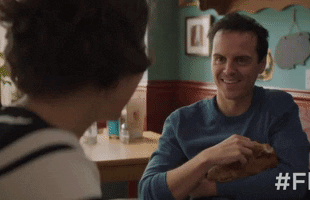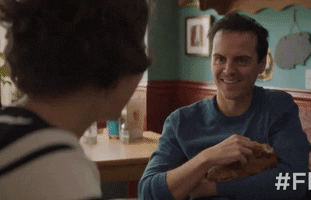Warning: this article contains spoilers!
“I love you.”
“It’ll pass.”
This is a soundbite from the very last scene in Phoebe Waller-Bridge’s Fleabag. This strikingly heart-wrenching quote has taken the internet by storm. From the typical Hot Priest velocity edit, to people posting how they’d react to being told “it’ll pass,” Fleabag has captured the heart of almost every young person — and for very good reason.
A British “dramedy” (comedy + drama), Fleabag explores the life of a London woman, Fleabag, her sister Claire, and her priest love interest, simply referred to as “The Priest.”
When I say Fleabag is one of the best TV shows of our generation, I truly mean it. First of all, I’ve never seen the female experience portrayed so accurately (both the good and the ugly). Throughout the show, Fleabag reckons with viewing her self-worth as solely reliant on her sex appeal, and navigates a deeply complicated relationship with her sister and the death of her best friend, all while trying to let herself be loved despite self-destructive tendencies.
As loud and as endlessly painful as Fleabag is, the delivery is so incredibly subtle — that’s part of what makes it so profound. For example, Fleabag is at a dinner with her family to celebrate her father’s engagement and it’s… excruciating to say the least. The dinner marks the first time she’s in contact with her family after over a year, and the only time they acknowledge Fleabag is when they’re pettily quipping about her. Breaking the fourth wall, Fleabag looks at the camera and says “no one’s asked me a question in 45 minutes.” Before she can finish, The Priest interrupts, asking her, “So, what do you do?” and the entire table falls silent.
It takes a few watches to notice their initial attraction to each other is almost palpable — whether or not it’s intentional, it works so well. Fleabag operates by incorporating entire monologues where she breaks the fourth wall while the people in her surroundings continue on with what they’re doing, oblivious to what she’s saying. While the audience is so focused on her internal conversation, they fail to see what goes on around her, dissociating with Fleabag.
And, just like everyone else in her life, the audience is just as complacent as she self destructs. She talks to us, but we don’t say anything back, silently enabling her to continue hurting herself. The only person who catches this is The Priest, who begins to pick up on her stares at the camera, wondering, “who is she talking to?” The same way we watch Fleabag and have access to every one of her thoughts, God watches The Priest in a similar fashion.
Besides his love for Fleabag, his relationship with God could explain why he is so receptive to Fleabag’s glances and remarks to the audience. Unlike everyone else, he understands what it’s like to be watched constantly, to give someone the luxury of omniscience at the expense of the self.
Aside from the more obvious love story between The Priest and Fleabag, the entirety of Fleabag also conveys the love story between Fleabag and herself. In the very first episode, she talks about the meaningless sex she has, even referring to one of her sexual partners as the “Hot Misogynist.” Fleabag doesn’t care that the man she sleeps with has no respect for women (and by extension, her). All she wants is to feel wanted. This is the experience of being a woman!
I won’t say too much (because everyone needs to watch it), but as much as I loved and was completely invested in the relationship between Fleabag and The Priest, Fleabag’s relationships with the women closest to her was the most powerful aspect of the show for me. I can’t go a day without thinking about this quote, said by Fleabag’s sister’s boss:
“Women are born with pain built-in. We carry it within ourselves throughout our lives. Men don’t. They have to seak it out. They invent all these gods and demons and things just so they can feel guilty.”
And that makes me sick! I don’t think any show could ever amount to how incredibly raw, relatable, and real Fleabag was. This Women’s History Month, give yourself the gift of ugly-crying to every episode of Fleabag while repeating “she is literally me” over and over again.

